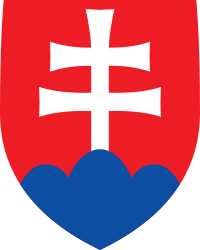Eduard Kukan
Eduard Kukan (born 26 December 1939) served as Minister of Foreign Affairs of Slovakia from 1998 to 2006.[1] He was a candidate in the presidential election held on 3 April 2004, and although pre-election polls had suggested he would come in first, he actually came in third behind former prime minister Vladimír Mečiar and Ivan Gašparovič, thus preventing him from contesting the run-off. He was elected Member of the European Parliament (MEP) in 2009, a position he held until 2019.
Eduard Kukan | |
|---|---|
.jpg) | |
| Member of the European Parliament from Slovakia | |
| In office 14 July 2009 – 2 July 2019 | |
| Member of the National Council of the Slovak Republic | |
| In office 4 July 2006 – 14 July 2009 | |
| In office 13 December 1994 – 30 October 1998 | |
| 7th Foreign Minister of Slovakia | |
| In office 30 October 1998 – 4 July 2006 | |
| Prime Minister | Mikuláš Dzurinda |
| Preceded by | Zdenka Kramplová |
| Succeeded by | Ján Kubiš |
| 3rd Foreign Minister of Slovakia | |
| In office 16 March 1994 – 13 December 1994 | |
| Prime Minister | Jozef Moravčík |
| Preceded by | Jozef Moravčík |
| Succeeded by | Juraj Schenk |
| Slovak ambassador to United Nations | |
| In office 1 January 1993 – ??? 1993 | |
| Czechoslovak ambassador to United Nations | |
| In office ??? 1990 – 31 December 1992 | |
| Personal details | |
| Born | 26 December 1939 Tornóc, Hungary (now Trnovec nad Váhom, Slovakia) |
| Political party | SDKÚ-DS(2000–2016) Democratic Union (1995–2000) |
| Spouse(s) | Zdenka Kukanová |
In 1999, Kukan was appointed United Nations Special Envoy on Kosovo by UN Secretary General Kofi Annan, a role he held alongside Carl Bildt.[2]
Early life and education
Kukan graduated from The Moscow State Institute of International Relations in 1964, where he has also gained an excellent command of the Swahili language. After graduation he received a Doctorate in Law from the Faculty of Law of the Charles University in Prague.
Diplomatic career
Since then his employments have included:
- Ministry of Foreign Affairs of Czechoslovakia in Prague (began on 1 August 1964)
- Headquarters in the Department of Sub-Saharan Africa (1964–1968)
- Secretariat of the Minister (1973–1977)
- Director of the Department of Sub-Saharan Africa (1981–1985)
- Director of the Department of Latin America (1988–1990)
- Czechoslovak Embassy in Lusaka (1968–1973)
- Czechoslovak Embassy in Washington from as Minister-Counsellor and Deputy Ambassador (1977–1981)
- Czechoslovak Embassy in Addis Ababa from as Ambassador (1985–1988)
- Permanent Representative of Czechoslovakia to the United Nations in New York (1991)
- Permanent Representative of Slovakia to the UN (1993)
- UN Chairman of the Committee for Social, Humanitarian, and Cultural Affairs
- Special Envoy for the Balkans (1991–2001)
- Minister of Foreign Affairs of Slovakia (March 1994 – December 1994)
- Minister of Foreign Affairs of Slovakia (October 1998 – 2006)
- Special Envoy for the Balkans (1991–2001)
Member of the European Parliament, 2009–2019
Kukan has been a Member of the European Parliament since the 2009 European elections. In the election campaign, he led the list of candidates of the centre-right Slovak Democratic and Christian Union (SDKÚ).[3]
Kukan has since been serving on the Committee on Foreign Affairs. In addition, he was a member of the Subcommittee on Human Rights between 2009 and 2014. In 2014, he moved to the Subcommittee on Security and Defence.
In 2010, Kukan joined the Friends of the EEAS, an unofficial and independent pressure group formed because of concerns that the High Representative of the Union for Foreign Affairs and Security Policy Catherine Ashton was not paying sufficient attention to the Parliament and was sharing too little information on the formation of the European External Action Service.[4]
Kukan led the parliament's monitoring mission during the Ugandan general elections in 2016.[5]
Other activities
- Global Panel Foundation, Member of the Board of Advisors[6]
Personal life
Kukan is married and has two adult children. In addition to his native tongue and Swahili, he speaks English, Russian, and Spanish. In 1993, he was awarded an honorary law degree by the Upsala College in New Jersey, U.S..
References
- "Eduard Kukan". European Parliament. Retrieved 26 May 2010.
- Jane Perlez (8 May 1999), Clinton Seeing Bosnian Model For Kosovo Use The New York Times.
- Toby Vogel (3 March 2010), MEPs struggle to influence creation of diplomatic corps European Voice.
- Toby Vogel (3 March 2010), MEPs struggle to influence creation of diplomatic corps European Voice.
- EU EOM Uganda 2016 European External Action Service.
- "Archived copy". Archived from the original on 20 September 2012. Retrieved 23 September 2014.CS1 maint: archived copy as title (link)
